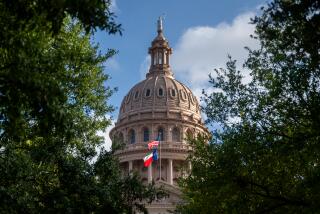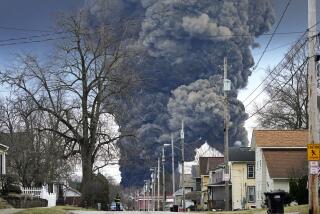Lieberman Takes On Bush on Texas Soil (and Its Air)
- Share via
ODESSA, Texas — Sen. Joseph I. Lieberman swooped onto the home turf of George W. Bush on Thursday, pounding the Texas governor’s environmental record on a visit to the oil flats where the Republican presidential nominee grew up.
At the same time, Bush’s running mate, Dick Cheney, set off on a bus tour through western Ohio, where he criticized the Clinton administration’s record on the military and other issues.
On a 200-mile journey featuring visits to a truck stop and an American Legion hall, Cheney, a former Defense secretary, also spoke out on the deadly explosion Thursday that crippled a U.S. Navy destroyer in Yemen.
“We need to find out who did it and retaliate very forcefully,” he said.
Lieberman, in a statement released Thursday, continued to push Palestinian leader Yasser Arafat to take control of the spiraling violence in the Middle East.
“Chairman Arafat must assert his enormous influence to rein in the Palestinians that are responsible for the unconscionable killings of the Israelis taken from the jail in Ramallah,” he said.
Domestic issues, however, were the main focus as Lieberman, the Democratic vice presidential candidate, kicked off a two-day visit to the Lone Star State that his aides dubbed the “Failed Leadership Tour.”
The first stop was a house here in the shadow of a petrochemical plant. He listened to four women from a poor section of town share stories of cancer, asthma, seizures and other health troubles that they believe stem from the acrid emissions spewing from the Huntsman Corp. facility.
Lieberman accused Bush of allowing pollution to thrive. “Gov. Bush ought to challenge his friends in this industry . . . to do a better job than they have done in cleaning up their act so that they can protect the health of people who are here,” he said.
“There is a failure of leadership when it comes to protecting the environment, protecting the public from environmental damage,” he said. “People have to ask themselves what would happen in Washington if he [Bush] were there.”
Odessa residents have threatened to sue Huntsman Corp. because of the alleged pollution, but so far there is no proven link between the emissions and the health problems.
“I don’t even have enough fingers [to count] the people who have died of cancer,” said Norma Nunez, 39, who had thyroid cancer and a tumor in her pituitary gland. Ten neighbors have died of cancer in the last 15 years, she said, and five family members have had cancer.
The Bush campaign disputed Lieberman’s charges, saying industrial emissions have dropped 11% on the governor’s watch. In 1999, Bush signed a law requiring older utilities companies previously exempt from the federal Clean Air Act to cut emissions by 50% in the next three years, Bush spokesman Dan Bartlett said. Another 1999 law set up a voluntary emission reduction program for non-utility companies such as Huntsman, he said.
“The program we put in place is working,” he said.
A Huntsman spokesman denied the plant was endangering the health of nearby residents, saying the company has spent $400 million making the plant safer.
Lieberman “has it dead wrong,” Huntsman spokesman Don Olsen said. “The plant is being operated well within state and federal guidelines. This facility is now safer and more efficient and more environmentally sound than it has been in its 50-year history.”
But Patrick Crimmins, a spokesman for the state’s environmental agency, said the plant has had various “upsets”--unscheduled releases of emissions--including a two-week period in December 1998 when the plant churned out smoke. The commission is investigating.
In Ohio, speaking before good-sized crowds made up largely of seniors, Cheney stumped for votes at stops from Maumee to Kettering--covering about 200 miles of a state considered crucial by both parties.
When the Cheney bus caravan stopped at a cafe called the Iron Skillet, Cheney listened intently as the truckers talked about the devastating effect rising fuel prices have had on both their industry and their individual businesses. He reiterated the call that he and Bush have made to increase domestic oil production, including opening up the Arctic National Wildlife Refuge for drilling.
One truck driver asked Cheney whether he thought the attack on the Navy destroyer in Yemen was an “act of war.” Cheney said it appeared to be so.
At a stop later at an American Legion hall in Kettering, Cheney declined to tie what the Bush campaign has called the deteriorating state of the American military to the attack in Yemen, saying enough information was not yet available.
More to Read
Get the L.A. Times Politics newsletter
Deeply reported insights into legislation, politics and policy from Sacramento, Washington and beyond. In your inbox twice per week.
You may occasionally receive promotional content from the Los Angeles Times.











